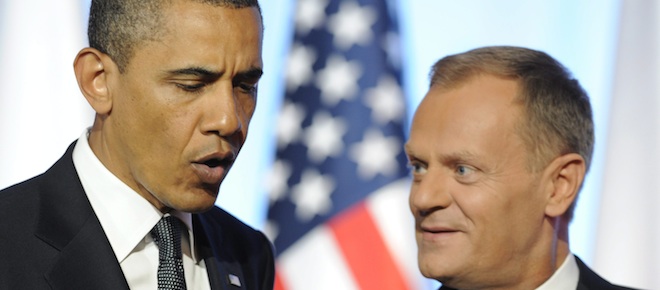Obama’s game plan: What he must do to counter Romney’s attacks
The Obama campaign seems to be taking a page out of the George W. Bush playbook
U.S. President Barack Obama and Polish Prime Minister Donald Tusk, right,speak after a press conference following their meeting at the Prime Minister’s Chancellery, in Warsaw, Poland, Saturday, May 28, 2011, on the second day of Obama’s visit to Poland. (AP Photo/Alik Keplicz)
Share

Last week’s debacle in Wisconsin had me thinking Barack Obama’s re-election hopes were in trouble. The Republican strategy of turning the presidential contest into a referendum on Obama can only work if the economy tanks and he fails to present a compelling view of the future. Granted, the Obama mystique has generally worn off after nearly four years of governing. The Obama of 2012 must take responsibility for his policies and decisions, he has a record to defend, and needs to contrast with what Mitt Romney brings to the debate.
Mitt Romney is on the attack, proposing few new policy initiatives while hammering Obama’s management of the economy. The attacks are ferocious, backed by the astronomical power of the Super PACs. The latest results show Romney is ahead on fundraising.
The Obama campaign seems to be taking a page out of the George W. Bush playbook of 2004. It’s trying to define its opponent in ways that contrast with what Obama promised as a “new way of doing politics.” It may work because negative advertising and attacks have had their place in American politics and Obama’s campaign is proving to be no exception. At the end of the day, it will not be enough.
Obama’s strategists must counter the notion that there’s a referendum on their man. They need to focus the debate on policies and leadership. A study of recent presidential campaign shows that Americans shop around when they are choosing their leaders, comparing individuals and their records.
Incumbents have generally won re-election since the FDR years, though that did not prevent voters from making Jimmy Carter and George H.W. Bush one-term presidents. It’s worth noting that Reagan, Clinton, and W. Bush seemed vulnerable in the year that preceded their re-election, their second terms enabled by weak opponents. So there is no prevailing theory on how an incumbent will do in the bid for re-election.
Obama has assets to counter the Republican challenge. The Wisconsin results of last week need not become the pattern–after all, Obama was not on the ballot in that recall election.
In the current campaign, he can point to real achievements. Even his major point of vulnerability, the economy, is not without success–more than 4 million private sector jobs, and the saving of GM and the domestic auto industry. In foreign policy, he can point to real progress on trade agreements, he’s reduced the scope of Al Qaeda, Iraq, Libya, and, of course, he eliminated Osama bin Laden.
Obama also benefits from a likability factor. He consistently scores higher than his party or his policies. People want him to do well, and generally are proud of him and his family on the world stage. He’s shown increasing assurance as President — a fact that is more and more acknowledged.
Obama has a vision that differs markedly from Romney’s. Independents remain the deciding part of the electorate along with some key elements of the electorate–women and Latinos. These independents are more inclined to shop around. Obama must eventually present a more compelling vision of his candidacy and contrast it with that of Romney.